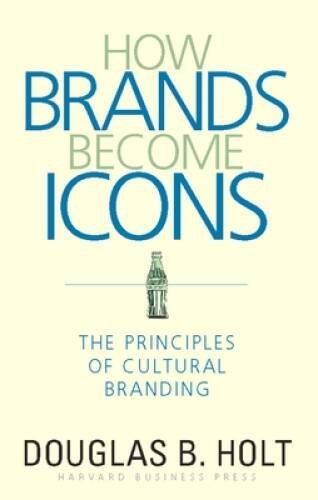
Item specifics
-
Condition
-
-
Brand
-
Unbranded
-
MPN
-
Does not apply
-
ISBN
-
9781578517749
-
Book Title
-
How Brands Become Icons : the Principles of Cultural Branding
-
Publisher
-
Harvard Business Review Press
-
Item Length
-
9.4 in
-
Publication Year
-
2004
-
Format
-
Hardcover
-
Language
-
English
-
Illustrator
-
Yes
-
Item Height
-
1.1 in
-
Genre
-
Reference, Social Science, Business & Economics
-
Topic
-
Consumer Guides, Marketing / General, Reference, Popular Culture
-
Item Weight
-
20.6 Oz
-
Item Width
-
6.5 in
-
Number of Pages
-
288 Pages
How Brands Become Icons: The Principles of Cultural Branding – VERY GOOD
About this product
Product Identifiers
Publisher
Harvard Business Review Press
ISBN-10
1578517745
ISBN-13
9781578517749
eBay Product ID (ePID)
30483539
Product Key Features
Book Title
How Brands Become Icons : the Principles of Cultural Branding
Number of Pages
288 Pages
Language
English
Publication Year
2004
Topic
Consumer Guides, Marketing / General, Reference, Popular Culture
Illustrator
Yes
Genre
Reference, Social Science, Business & Economics
Format
Hardcover
Dimensions
Item Height
1.1 in
Item Weight
20.6 Oz
Item Length
9.4 in
Item Width
6.5 in
Additional Product Features
Intended Audience
Trade
LCCN
2004-002697
Dewey Edition
22
Dewey Decimal
658.827
Synopsis
Based on an extensive examination of the historical records of legendary iconic brands, Holt (marketing, Oxford University) demonstrates that brands become icons not by highlighting unique features, but by addressing acute cultural contradictions with myths conveyed through advertising. He builds a new cultural branding model that revises core mark, Coca-Cola. Harley-Davidson. Nike. Budweiser. Valued by customers more for what they symbolize than for what they do, products like these are more than brands–they are cultural icons. How do managers create brands that resonate so powerfully with consumers? Based on extensive historical analyses of some of America’s most successful iconic brands, including ESPN, Mountain Dew, Volkswagen, Budweiser, and Harley-Davidson, this book presents the first systematic model to explain how brands become icons. Douglas B. Holt shows how iconic brands create “identity myths” that, through powerful symbolism, soothe collective anxieties resulting from acute social change. Holt warns that icons can’t be built through conventional branding strategies, which focus on benefits, brand personalities, and emotional relationships. Instead, he calls for a deeper cultural perspective on traditional marketing themes like targeting, positioning, brand equity, and brand loyalty–and outlines a distinctive set of “cultural branding” principles that will radically alter how companies approach everything from marketing strategy to market research to hiring and training managers. Until now, Holt shows, even the most successful iconic brands have emerged more by intuition and serendipity than by design. With How Brands Become Icons, managers can leverage the principles behind some of the most successful brands of the last half-century to build their own iconic brands. Douglas B. Holt is associate professor of Marketing at Harvard Business School., ‘¬SIconic brands’¬� (ie: Coca-Cola, Volkswagon, Corona) have social lives and cultural significance that go well beyond product benefits and features This book distills the strategies used to create the world’¬”s most enduring brands into a new approach called ‘¬Scultural branding”. Brand identity is more critical than ever today, as more and more products compete for attention across an ever-increasing array of channels. This book offers marketers and managers an alternative to conventional branding strategies, which often backfire when companies attempt to create identity brands.
LC Classification Number
HD69.B7H647 2003
Price : 5.35
Ends on : N/A
View on eBay



